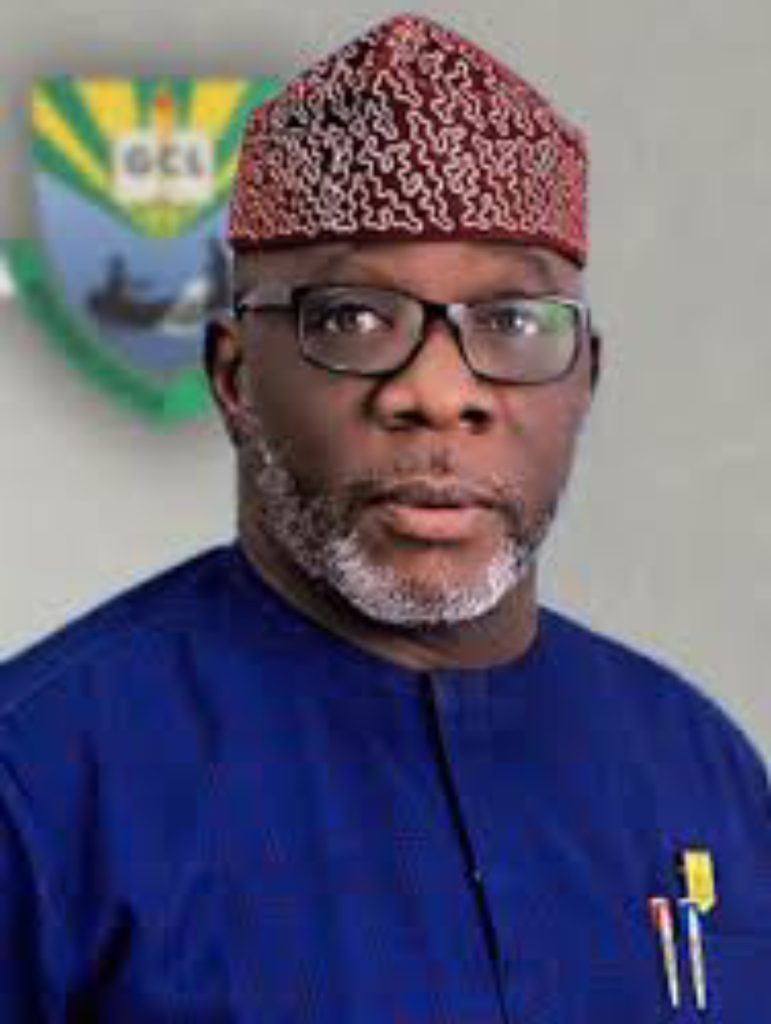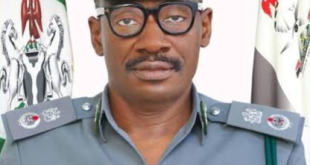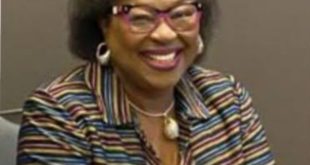
The Nigerian-South African Chamber of Commerce recently held its monthly forum in January with the theme: “Nigerian Security Challenges: The Way Forward”. Rear Admiral Oyeleye Jaiyeola(rtd) delivered the Keynote Speech. He is a former Fleet Commander of the Western Fleet, Nigerian Navy and Commandant of the Defense Intelligence College,Nigeria.
He is currently the Chairman and Principal Consultant of Owiwi Cubes Limited, a leading technology-driven intelligence security consulting and training firm, based in Lagos.

The event which attracted many members of the Chamber and invited guests was sponsored by Protection Plus Limited.
Jaiyeola in his paper x-rayed the causes of insecurity in the country, positing that agitation for fair share and government’s continuous failure to deliver performance and basic needs of the people are the key stimulants of insecurity. Presented here is an excerpt of the speech.

Today we have an alarming level of insecurity in every part of the country, leaving unparalleled consequences to the nation. Insecurity has assumed a pervading form in the country. The government is challenged to do what could be done to avert this menace.
I’ll tell us that although advanced countries of the world, like France, Britain, Switzerland, are faced with challenges of security, and I must say even on a daily basis, but you’ll agree with me that our security situation is obviously taking a different dimension.
The nation is currently witnessing consistent pressure on the government with increasing speed. We have the challenge of kidnapping in almost all the geopolitical zones. In the North-east, there are still pockets of Boko Haram bandits wreaking havoc in some of the villages. In the north-west, we have the rural bandits and kidnapping going on. North-central, we have the challenge of farmers and pastoral clashes. In the South-south, of course, we have armed militants operating in the mangroves and are engaged in all manners of economic sabotage.
And in the South-west and south-east, you have local militias filling the vacuum created by the absence of the states, and they are heating up the polity with ethno-religious rhetoric.
The threat to the national security and increasing wave of crimes placed Nigeria on the fourteenth position in the ranking of peace index. Yes, that was in 2022, and I’m sure you will agree with me by now it would have gone down.
Maybe it would be eight or within the single digits. In the midst of this confusion, Nigerians
are asking, where is the state? And many Nigerians understand the grave consequences of surrendering our sovereignty to a mob of violent and non-discerning non-state actors.
Nigeria has witnessed and is currently witnessing unprecedented level of insecurity. You have the inter-communal, and ethnic clashes, ethno-religious, armed banditry, assassination, murder, and so on.
And I must say that the deteriorating situation in the country has posed serious threats to
our economic development. These challenges include endemic rural, and urban violence,
and poverty. We have high rate of youth unemployment, low industrial output, unstable
and deteriorating exchange rate, high inflation, as you can see. So, the question on our mind
is, can there be security? Is security of lives and properties still achievable in Nigeria? Despite these plethora of security measures taken by the government, it’s becoming daunting and challenging.
Now, the meaning of security is ambiguous.
Like Charlie Haddad said, that its scope expands every day. The elastic nature of the concept of security attracts different meaning and different views.
Thus, security remains an important concept that every human person desires, and it has one or two meanings, though it defies a precise definition.
Security is subjective. Notwithstanding, if you look at it from the position of Barry Boozer, it is that security is ambiguous, and it’s a multi-dimensional concept. There are so many ways we can look at it, thus, the main assumption of the concept, is notwithstanding, what constitutes security in modern times, it remains a question that has never been answered satisfactorily by scholars and even researchers.
Its perception, even within one community, varies with time.
What you see as security differs from what I see as security. As such, the main assumption of this conception is that threat of violence and the actual ability to commit violence by state against an enemy successfully deter threats and aggression.
At the domestic level, the belief is that internal law enforcement agencies and other instrument of domestic intelligence, are all that is required for a state to be secured. They would have been proved wrong in Nigeria and we throw that up, because you realize that the state are apparatus and has find it very difficult to manage their security. And I guess that’s where the private security aspect comes in.
Presently, there’s an attempt to broaden and accommodate others, relevant, if not critical, element with this conception of security. The conventional, militaristic concept of security
that used to dominate in the cold War discourse has become ineffectual, and is grossly incapable of meeting the security expectations of many.
What do I mean by that? In those days, we just believed that security is in the purview of those that wear uniform.
And as posited by Hettne, he says security is “a reasonable level of predictability at different levels of social system, from local communities to global level.”
The understanding here is that at the global level, there’s a presence of another which is gradually predicated upon the predictability of the behavior of other members within the system.
There are some assumptions within, there are some normal behaviors expected of people. And with that, you can predict. But as time goes on, you realize, that these days there are so many things you can’t even predict.
In those days, we’ll say that in Nigeria, you can never have a suicide bomber. But these days, I mean, somebody can just decide to place himself above himself.
So, the perception is changing. At the local level, security includes the ability of the state to predict the likely implication at any particular condition on its citizens.
But that itself is even changing. To what extent can this prediction be made now? We all knew what happened at “EndSARS”
The recognition lies clearly not on the state ability to enforce law and order. Though that may be important, but in creating the necessary social, economic conditions that guarantees fair amount of predictability of the behavior of its citizens.
In other words, the responsibility is being placed on the state to be able to provide this needful, but along the line, we’re going far from that.
As a great recognition of the relevance of other elements, such as political, environment, economic, and social factors. These are irreducible components of security of any country, territories, state, institutions, and others. In all places and countries, security has been considered as a first order value that is worth preserving.
That, we’re gradually losing. There is no consensus definition of security. We can throw it whichever way we want to.
And then the concept of security has been seen as a situation where a person of fate should not be exposed to any form of danger or risk, physical or moral aggression, accident, theft or deterioration.
I want to dwell on the words of Walter Liegeman, he said a nation has security when it does not have to sacrifice its legitimate interest to avoid war and it is able, if challenged to maintain them by war and then that aspect of security is what lies with our conventional services which I think the Navy, Air force and the Army are doing and, of course, if you look at it, there’s no security experts that will not be familiar with Monotaro and his position on national security and national interest. He said they are interrelated. The former is seen in terms of power and therefore is the essence of politics and I will not fail to mention somebody, he’s late now but I refer to him as a godfather when it comes to security in Nigeria. Professor Thomas, he said national security is the defense and the survival of the state. In other words, the survival of the state is what we call security.
To what extent can the state survive? I leave you with that.
Now to the meat of my presentation, which is the challenges of national security.
Security is a problem that has affected or is capable of affecting the attitude, confidence,
and cooperation of all groups and segments that make up the Nigerian federation.
What are the major security challenges?
The chairman said, some of them while speaking.
He told us we have the political conflicts which are there, we have the social and economic agitations, we have ethno-religious crisis, we have ethnic militia, we have boundary disputes, we have cultism, we have criminality and of course, organized and non-organized crime.
These days, a lot of people gather to do and undo.
The insecurity in Nigeria has been on the increase and this has been compounded by occurrences of terrorism since the return to democratic governments in Nigeria.
Some people say the violence in the country can be traced back to 1960 due to the various political instability and military interventions in the political affairs of the state.
The first challenge that comes, is how we came together. We don’t like talking about it, but that has been a major challenge.
The democratic state of Nigeria is meant to be federalist in nature, which entails that there is a share of power and resources among the component units of government.
That’s what it’s meant to be, but to what extent has that been achieved becomes a problem.
Sir Kenneth Wheare conceptualizes federation, and he said as a constitution of division of power between the levels of government which are independent and coordinated in their respective sphere of influence.
So the first challenge we have is the federation of power we call Nigeria. We don’t like facing it, but we realize that the basic problem of our insecurity is the agitations for fair share. And if we dig down, there is a challenge of generational gap.
We did a research in 2020 and we came to discover that as of 2020, over 70% of Nigerian population fall below the age of 25. That means you have a country with youth bulge. And most of them don’t know the history of Nigeria. They don’t know our origin. They don’t know our beginning.
The understanding of federation is amazed, so there are agitations. Most of the agitations have led to ethno-religious crises comes from the lack of understanding on the part of the government of what a federal system is. And of course, It’s not farfetched, the reason the military government could operate a federated state comfortably because there is command and control.
The man sitting at the federal end is the most senior, he dishes out instructions and you don’t have a choice but to obey, but when you transit into the civil regime, understanding the federation state becomes an issue, so it’s important that we need to get that right.
This has set in tone for the militarization of the federalistic democratic governance of the state.
And this manifested in overwhelming power of the central government in the distribution and sharing of national resources to its discretion, unitarily and adjusting to the host component of such resources. And this has heightened agitations and demand for a true federalism, physical and political restructuring from different frontiers and other parts of government.
These demands are being colored by ethnic and tribal ambivalence from members of these groups who vary in allegiance.
In the South-west, we had the OPCs. In the South-east we had so many groups. In the South-south, we had men and so many other groups coming up.
Another basic cost and challenge to our security is the breakdown of cultural values. Erosion of cultural values due to increasing acculturation and negative external influence.
The global village, the IT world has eroded what we stand for as values and culture and that in itself has caused a lot.
The caution of the military to governors and consequent imposition.
There is the challenge where I said its ethnic, religion and other pre-modern elements have assumed points of essence and identification of reasoning in Nigeria. If somebody steals in Nigeria, the first question you expect a natural mind to ask. Why would he steal? Whereas the reaction would be which part of the country is he from? What religion is he? Is he the only person? And so that in itself is causing a big problem.
And there’s a group thinking that has bared a true national identity for Nigerians. We do not want to call it national identity and that in itself is a challenge to our security. Because in a situation where you cannot really stand and say you are a Nigerian, it’s a problem and the formation of various militia group in the state.
And their rise to violence is another form of fate that Nigeria is contending with.
There are several militia groups that have come up in the guise of asking for their own share. Whether they have come up in ethnic or under religious guise and they are supposedly formed to protect the interests of their tribe and fight for justice for their ethnic affiliation, so that is part of our challenge.
That is the major part of our security challenge. Then of course like I said here the various militia groups that have come out of it. Some of them believe that if they want to get recognition, maybe they just gather some people together and make some noise, they will be recognized and they will give them a share of their own. Well, that’s where we and the direction we have gone into.
Then another one that is closely linked to this, is the issue of the border, because we have porous borders and we are enclosed by so many francophone countries and you realize that our borders are so porous. There are so many ungoverned borders. That in itself is a challenge to us.
Like the most highly revered Catholic Bishop, Bishop Mathew Kuka said, Nigeria remains a country that is prompted by Boko Haram, banditry, bandits, kidnappers, armed robbers and other merchants of death across the nation. Everybody can do whatever they like.
And of course, another major problem which is a challenge and a cause of our insecurity is the breakdown of infrastructural structures. The incapacity of government to deliver public service and provide the basic needs for the masses has given rise to security challenges. That’s what we call, the terror franchise or survival of the fittest.
And of course I said there are mass abduction. We know the Chibok girls. In 2012, the Damapak school children 2015, Damchi girls 2018 and it’s continuing every day. Some guys just believe that to make money now, what you do is to kidnap for ransom. It’s becoming a thing of the day.
So, part of the cause and the challenge of our security is the incapacity of the government to deliver public service and provide the basic needs. The statistics released by the National Bureau of Statistics in 2021 Showing the nation’s unemployment rate, says 70% of our population are youths and 80% of the youths are not educated.
The Labour force, between age 16 and 64, everybody is willing to work but there is no work even those that have work to do, the efficiency level is dropping. The large number of youths that are not working are capable of undermining and constituting major security threat.
Another Cause Is Poverty. When a man is poor, they can do and undo. So the condition of poverty, either predisposes you to crime or terrorist activity or enhance the goals of terrorism. Somebody will say that poverty standing alone cannot cause terrorism, but can be a strong contributing factor to the menace of insecurity and terrorism.
Poverty and economic inequality do cause insecurity and terrorism. And poverty without freedom and good governance can support terrorism, just as poverty within the context of a failed, fragile, or failing state may trigger insecurity. And you’ll
agree with me that if a man is poor, the man is not educated, where he’s educated, he doesn’t have a job, he becomes a tool.
Looking at the challenges to our security situation, I know that we know the basics, but the main issues we need to deal with are here and if these can be addressed, it makes it easy for us to deal with.
And another cause or challenge to national security is the asymmetric power relations between and among disparate components in the country.
Political affiliations like in Rivers state. So there’s a need for the federal, state and local government to sponsor programs of cultural and political orientation.
Another problem is the leadership distribution in Nigeria. The Nigerian entity is no longer there, so it is now “my turn”
Effects Of Insecurity
Loss of investment, like the speculation going round that some embassies are now afraid of Abuja and now wants to run to Lagos.
Destruction of critical infrastructure like what happened during the “ENDSARS”
Disruption of economic activities, armed robbery, assassination, ritual killing and numerous fraudulent activities, all these can hinder economic growth, so it’s a big problem on our hand.
Measures To Take To Address Insecurity
We need to use diplomacy to rally around and neutralize threat.
It must be an all stakeholders approach, we need to take security from within by involving our religious and traditional leaders.
We need to maintain effective arm forces, the police in particular are highly incapacitated in terms of skills and training, logistics, weapons, etc.
Another measure is the enthronement of good governance with comprehensive restructuring and transparency in government especially in financial dealings.
Private security outfits in Nigeria should complement the effort of the conventional security.
Promotion and teaching of good morals, we need to go back to the basics.
 MMS PLUS NG – Maritime, Aviation, Business, Oil and Gas News Online Newspaper with coverage in Maritime, Oil and Gas, Aviation, Power and Energy as well as Financial News
MMS PLUS NG – Maritime, Aviation, Business, Oil and Gas News Online Newspaper with coverage in Maritime, Oil and Gas, Aviation, Power and Energy as well as Financial News









